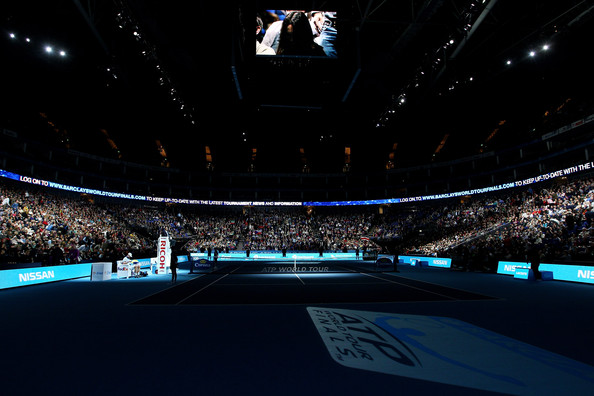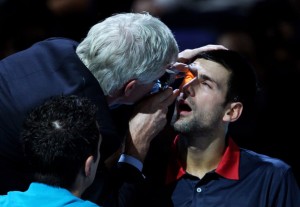Nadal d. Djokovic, 7/5 6/2
When the draw for the ATP World Tour Finals was released last week, and we shyly confessed our relief that the Big Four were evenly split between the two groups, there was immediate anticipation of two matches in particular. These were Federer v Murray, and Nadal v Djokovic. Even if every other match degenerated into an error-fest or eternal grind, expectations were high that these would be encounters to savour.
Federer, coming off the Shellacking in Shanghai, was in fine form and surely intent on atonement. Murray would be determined to delight his temporary compatriots and assert his dominance over the great Swiss. Nadal would be anxious to erase the shame of last year’s efforts, when he failed to win a single set. Djokovic would be out to avenge the US Open final, and keen to re-establish his hardcourt dominance over the world No.1.
It was all so clear. It was gonna be epic.
 Except it wasn’t. Federer came out brilliantly, reading Murray and the moment perfectly. How inspired was the decision to receive? Murray had been accused of over-hyping himself for his round robin dust-up with Federer last year, whatever that means. He has ably protected himself from such accusations this time round, although his efforts are certainly worthy of the general bafflement and frustration his loyal Engli . . . British fans must be feeling. It was not unlike the Australian Open final, if only in the way that it demonstrated how Federer masters and exploits his opponent’s tension. Murray was lucky to avoid a bagel in that second set, although from 0/4 15-40 he actually started to play really well. While tennis’s scoring system means it’s technically never too late for a comeback, it was too late. Still, if the Scot can play against Ferrer the way he did against Soderling on Sunday, he should progress to the semifinals, where he’ll presumably run into Nadal.
Except it wasn’t. Federer came out brilliantly, reading Murray and the moment perfectly. How inspired was the decision to receive? Murray had been accused of over-hyping himself for his round robin dust-up with Federer last year, whatever that means. He has ably protected himself from such accusations this time round, although his efforts are certainly worthy of the general bafflement and frustration his loyal Engli . . . British fans must be feeling. It was not unlike the Australian Open final, if only in the way that it demonstrated how Federer masters and exploits his opponent’s tension. Murray was lucky to avoid a bagel in that second set, although from 0/4 15-40 he actually started to play really well. While tennis’s scoring system means it’s technically never too late for a comeback, it was too late. Still, if the Scot can play against Ferrer the way he did against Soderling on Sunday, he should progress to the semifinals, where he’ll presumably run into Nadal.
 Which brings us to today’s amply-fanfared US Open final rematch. Nadal’s detractors – who are not necessarily all pro-Federer zealots, although they mostly are – have accused the Spaniard of getting lucky against Roddick on Monday, presumably in much the same way that he lucked his way to three Grand Slams this year. Today’s ‘win’ over Djokovic will probably do little to quieten their wailing, nor still the gnashing of their teeth. The first seven or so games of the first set were very good. Djokovic was clearly the superior player, executing the seemingly counter-intuitive but now widely-applied tactic of going hard at Nadal’s forehand. The Spaniard was scrambling and clawing. Here was the epic the draw had promised! Then, at 3-4 and after only about four hours on court – these two play at a truly glacial pace – the contact lens in Djokovic’s right eye malfunctioned. That was pretty much that. Half-blind, he played out the match – I suspect he’ll never default ever again if he can help it – and it wasn’t pretty. It was, at least by the standards of these two, pretty quick. Assuming his eye recovers, Djokovic can still make the semifinals, although that Davis Cup final must now be looming menacingly in his mind.
Which brings us to today’s amply-fanfared US Open final rematch. Nadal’s detractors – who are not necessarily all pro-Federer zealots, although they mostly are – have accused the Spaniard of getting lucky against Roddick on Monday, presumably in much the same way that he lucked his way to three Grand Slams this year. Today’s ‘win’ over Djokovic will probably do little to quieten their wailing, nor still the gnashing of their teeth. The first seven or so games of the first set were very good. Djokovic was clearly the superior player, executing the seemingly counter-intuitive but now widely-applied tactic of going hard at Nadal’s forehand. The Spaniard was scrambling and clawing. Here was the epic the draw had promised! Then, at 3-4 and after only about four hours on court – these two play at a truly glacial pace – the contact lens in Djokovic’s right eye malfunctioned. That was pretty much that. Half-blind, he played out the match – I suspect he’ll never default ever again if he can help it – and it wasn’t pretty. It was, at least by the standards of these two, pretty quick. Assuming his eye recovers, Djokovic can still make the semifinals, although that Davis Cup final must now be looming menacingly in his mind.
There is seemingly no shortage of prominent commentators keen to see the Tour Finals fail, if only to be affirmed in their conviction that failure is inevitable. I presume there’s no malice in it. From this perspective, the temptation must be strong to the view these matches as metonymic for the entire tournament. The position is understandable, but surely it’s premature to be writing the event off just yet. Precedent tells us that sometimes the Tour Finals don’t get going until the knock-out stages. Shanghai 2002 leaps to mind, when a week of solid yawns gave way to some excellent semifinals, including a young Federer’s desperate loss to world No.1 and defending champion Lleyton Hewitt. Or how about Shanghai 2005, when a depleted field emphatically failed to fire, only for the final to produce an electrifying classic as David Nalbandian recovered from two sets down to overcome a hobbled Federer?
Sometimes, for almost no reason at all, an entire tournament is just a fizzer. Wimbledon 2001 remains one of the greatest events I’ve ever seen, replete with astounding tennis, new dawns, high drama, and a simultaneously heartbreaking and fairytale finale. Wimbledon 2002, by contrast, was basically awful. Same tournament, same location, mostly even the same players. It just happens sometimes. Luckily, the AELTC held out – slaves to tradition as they are – and chose not to relocate, reformat, reschedule and rebadge The Championships. 2003 turned out pretty well.
Hopefully this year’s World Tour Finals will pick up, and we’ll see some good stuff come Saturday, if not before. And if there isn’t? Well, it’s nothing a name-change and shifting the whole shebang back to Shanghai can’t fix.

3 Responses to A Seductive Metonymy